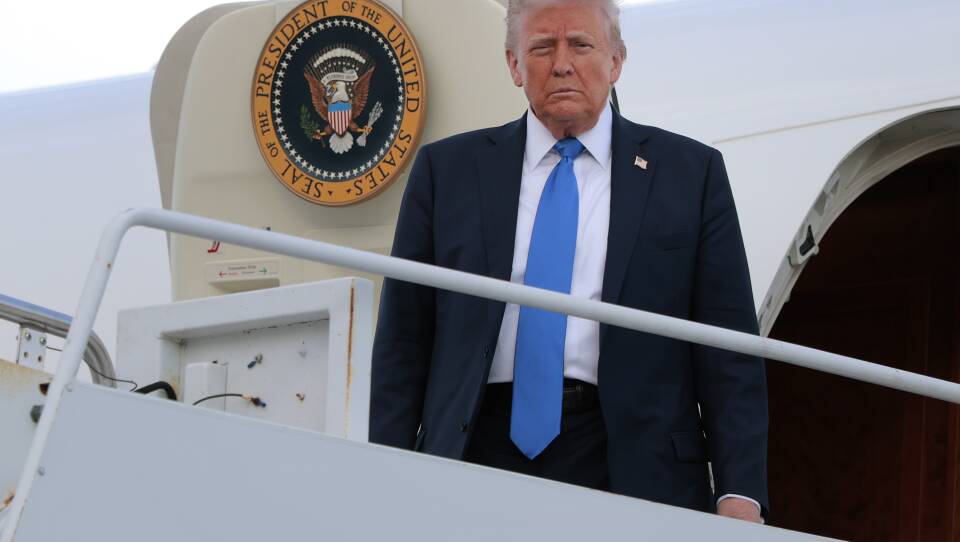In a little over three months, President Donald Trump has kept his promises to reshape the government. In addition to a flurry of executive orders, he has deployed administration officials, Cabinet members, and Elon Musk’s Department of Government Efficiency – also known as DOGE – to slash funds and the federal workforce, deport suspected undocumented residents, revoke student visas, and implement his controversial tariffs strategy.
Jerold Duquette, professor of political science at Central Connecticut State University, said he’s skeptical of the DOGE’s achievements within the first 100 days of Trumps second presidency.
“If you think that they were actually trying to make the government more efficient, then it didn’t work well at all,” Duquette said. “But if you understand that what they were trying to do is to cripple the regulatory capacity of the government, then I think it worked or it’s working. There’s been a great deal of confusion created, even though most of the actions taken to date may end up being reversed by courts. Through the use of DOGE, he has, in fact, caused incredible confusion within the bureaucracy.”
Confusion within the administration is also affecting the already murky immigration system, which Trump promised to fix during his campaign. In his first 100 days, Trump has pushed for deportations, detentions and raids, and has ordered planes of undocumented immigrants to be flown to a prison in El Salvador. The administration has confirmed that one person – Kilmar Abrego Garcia – has mistakenly been deported to El Salvador.
However, Erin O’Brien, political science professor at the University of Massachusetts Boston, said President Trump’s actions on the immigration front are bigger than raids and deportations.
“This is big question for this administration: they’re trying to change the notion of who belongs in the United States. And to say, if you’re a recent immigrant, documented or not, disproportionately, if you’re brown or you’re Black, then maybe you don’t belong,” says O’Brien about the Trump administration’s perspective. “Going after these sanctuary cities, going after individuals who were not the ‘worst of the worst’ – these are individuals that were registered, were doing the yearly check-ins that they were supposed to with government. It’s intended to reshape who belongs in the United States. Immigration wars aren’t new in the U.S., but we’ve never had a modern president who so wants to rewrite the racial order in the United States.”
Trump’s latest major move is his tariffs plan, which has rocked the domestic and global economy. Recent polling shows that Americans disapprove of Trump’s tariffs strategy, which may correlate with the president’s lowering poll numbers. Luis Jimenez, associate professor of political science at University of Massachusetts Boston, said he thinks this particular plan will have a disproportionate impact on Americans compared to Trump’s other executive orders.
“Not everybody knows an immigrant. Not everybody has friends in the bureaucracy or works for higher ed, but everybody has a paycheck that is going to be hurt by this,” Jimenez said. “Inflation is going to go up. The economy is going get hurt, and he’s definitely going to – politically – pay a price, to some extent. If he actually goes through with this, and this actually happens, I would imagine [Trump] would be in the 20 percent range of approval rating by next year. But even then, the damage that he’s going to do by then, it’s going to be massive.”
The president’s actions through budget, grant and workforce cuts, plus battles against universities like Harvard, have started to affect Massachusetts directly, which Duquette said is meant to punish the Commonwealth.
“This is all performative,” Duquette said. “Owning the libs – where better to do that than in New England and, especially, in Massachusetts? There’s no question that, at the end of the day, Massachusetts is going to have to find other ways to fund some things. There’s no question that even after lawsuits and funding is restored because of lawsuits, the relationship between Massachusetts and the federal government, for at least the medium-term future, is going to change. And Massachusetts is going have to be more self-reliant.”
All that and more in this week’s all-politics roundtable with the Mass Politics Profs!
Guests
- Erin O’Brien, professor of political science at the University of Massachusetts Boston
- Jerold Duquette, professor of political science and director of the Public Policy & Management Concentration at Central Connecticut State University.
- Luis Jimenez, associate professor of political science at the University of Massachusetts Boston.
Stories featured in this week’s roundtable
- The Atlantic: DOGE Was Bad. Schedule F Will Be Worse.
- CBS: Trump “border czar” Tom Homan says Kilmar Abrego Garcia’s deportation to El Salvador wasn’t a mistake
- NPR: The White House threatens sanctuary cities in another EO, but courts are skeptical
- Education Week: How Trump Has Changed Schools in His First 100 Days: A Timeline
- PBS Newshour: A timeline of Trump’s tariff actions so far
- The 19th: Your Shein and Temu purchases are about to get more expensive
- Bloomberg News: Trump’s Poll Numbers Drop Near 100-Day Mark, Raising Tax-Plan Stakes
- NY Times: Voters See Trump’s Use of Power as Overreaching, Times/Siena Poll Finds
- AP: Carney wins Canadian election, while Conservative leader loses his seat in Parliament
- The Conversation: What have the Democrats achieved in Trump’s first 100 days?
- NPR: The next AOC? Young Democrats are aiming to topple incumbents inside their own party
- MassLive: Trump at 100 Days: ‘Massachusetts will resist,’ top Beacon Hill Dem says
- Axios: Wu on the front lines while Healey stays quiet
- WCVB: Massachusetts U.S. Rep. Jim McGovern goes 'On The Record’ about Donald Trump, ICE, Harvard
- Bay State Banner: Mass. Museum of African American History loses $500,000 in funding after executive order
- CBS/WBZ: President Trump’s tariffs are hurting Massachusetts construction industry, lawmaker says






